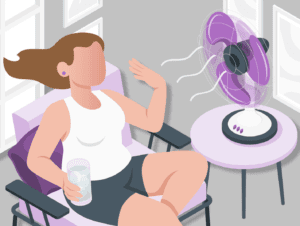Menopause at work
Menopause at work
Menopausal women are the fastest-growing demographic in the workforce, so it’s important now more than ever to be able to speak openly about menopause at work.
Businesses are now starting to make progress when it comes to addressing the menopause.
Companies such as Royal Mail, the BBC and Tesco have already signed a pledge to take steps to ensure that the right support is given to the employees affected.
But what can smaller businesses do?
Having regular conversations with staff and listening to their concerns will certainly help some of the early issues before any potential legal action is taken.
Employers should make sure they know how the menopause relates to the law, including the:
- Equality Act 2010, which protects workers against discrimination.
- Health and Safety at Work Act 1974, which says an employer must, where reasonably practical, ensure everyone’s health, safety and welfare at work.
The menopause is not a specific protected characteristic under the Equality Act 2010. But if an employee or worker is put at a disadvantage and treated less favourably because of their menopause symptoms, this could be discrimination if related to a protected characteristic, for example:
- age
- disability
- gender reassignment
- sex
Jenny Arrowsmith, an employment law partner at Irwin Mitchell recently warned that there could be an increase in tribunal claims involving the menopause. She also said that having a Menopause policy in place would help give clarity and help companies communicate and provide a framework for employers, thus giving evidence to their response if they were challenged in a tribunal.
A recent YouGov poll commissioned by Irwin Mitchell revealed that out of 1,025 HR professionals:
- 72% of companies did not have a menopause policy in place.
- 44% admitted they had not thought of implementing one.
- 15% considered it not to be a priority.
- 7% said they were holding back due to it being an embarrassing issue.
What is the Menopause?
The menopause is a natural part of the ageing process that generally occurs between the ages of 45 and 55. The individual’s oestrogen levels begin to decline which marks the end of their menstrual cycles. It Is often diagnosed after that individual has gone 12 months without having a period.
Menopause is a natural biological process. But the physical symptoms, such as hot flushes, and emotional symptoms of menopause may disrupt your sleep, lower your energy, or affect your emotional health. It’s been found that many women say that they often find managing their menopause symptoms in the workplace very challenging. Many find it hard to discuss the menopause at work, so coping with these symptoms and not feeling as though you can discuss this openly can have a negative impact on those that are struggling.
Symptoms
In the months or years leading up to menopause (perimenopause), your employee may experience some of these signs and symptoms;
- Irregular periods
- Chills
- Night sweats
- Sleep problems
- Mood changes and irritability
- Weight gain and slowed metabolism
- Thinning hair and dry skin
- Loss of breast fullness
- hot flushes and dizziness
- palpitations and breathlessness
- irregular periods and heavy bleeding
- painful menstrual cramps
- headaches and migraines
- low energy levels and fatigue
- reduced concentration and memory loss
- increased emotional sensitivity and loss of confidence
What can an employee do?
If you are experiencing menopausal symptoms that are starting to impact your ability to work, you should try to speak to your manager and let them know what you are going through. This may feel awkward in a professional environment especially if your manager is someone you don’t feel comfortable talking to about personal matters. Try talking to another member of the management team or talk to HR.
Before speaking to someone you could try:
- taking notes of your menopausal symptoms and how or when they are affecting you
- preparing what you plan to discuss with a friend
- thinking of solutions that you think could help your situation
How as an employer can you support your people?
Having a menopause policy in place is not, as a matter of law, a mandatory requirement. However, by failing to support those staff who may be suffering from menopause-related symptoms, can potentially give rise to a number of practical and legal risks.
From a practical point of view, a lack of adequate support for sufferers can lead to:
- poor employee engagement and low morale
- reduced performance and lost productivity
- high rates of sickness-related or even unauthorised absenteeism
- poor working relationships and conflict at work
- a damaged employer-employee relationship
- loss of valuable members of staff who feel forced to resign
If you don’t have a menopause policy in place, now might be the right time to consider getting one in place.
You may want to adjust your current policies to take into consideration the needs of staff who may be going through the menopause. This may include your:
- Sickness policy – to support staff who may need time off due to menopausal symptoms.
- Absence policy – to support staff who need time off to attend medical appointments.
- Flexible working hours – to consider possible adjustments to start and finish times if needed.
- Adjustments to physical environment – include adjusting the air conditioning, providing employees with a fan, or the option to move to an alternative desk.
- Female only spaces for rest/changing – access to female only washing and facilities which allow employees to rest, dispose of sanitary products and take a break from their working day.
Need Help?
Our HR team can advise and guide you on how to approach menopause in the workplace. We can certainly help implement a menopause policy for your business. For help and guidance call us today.


